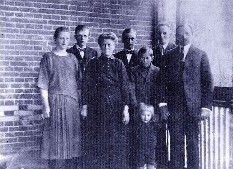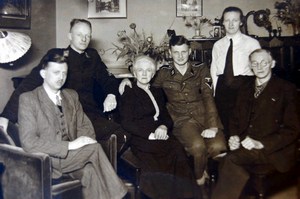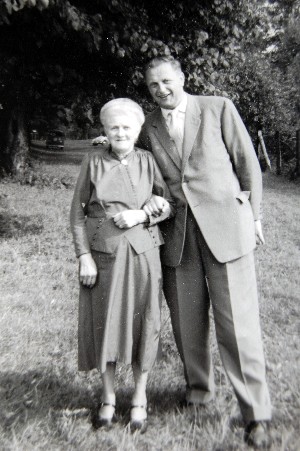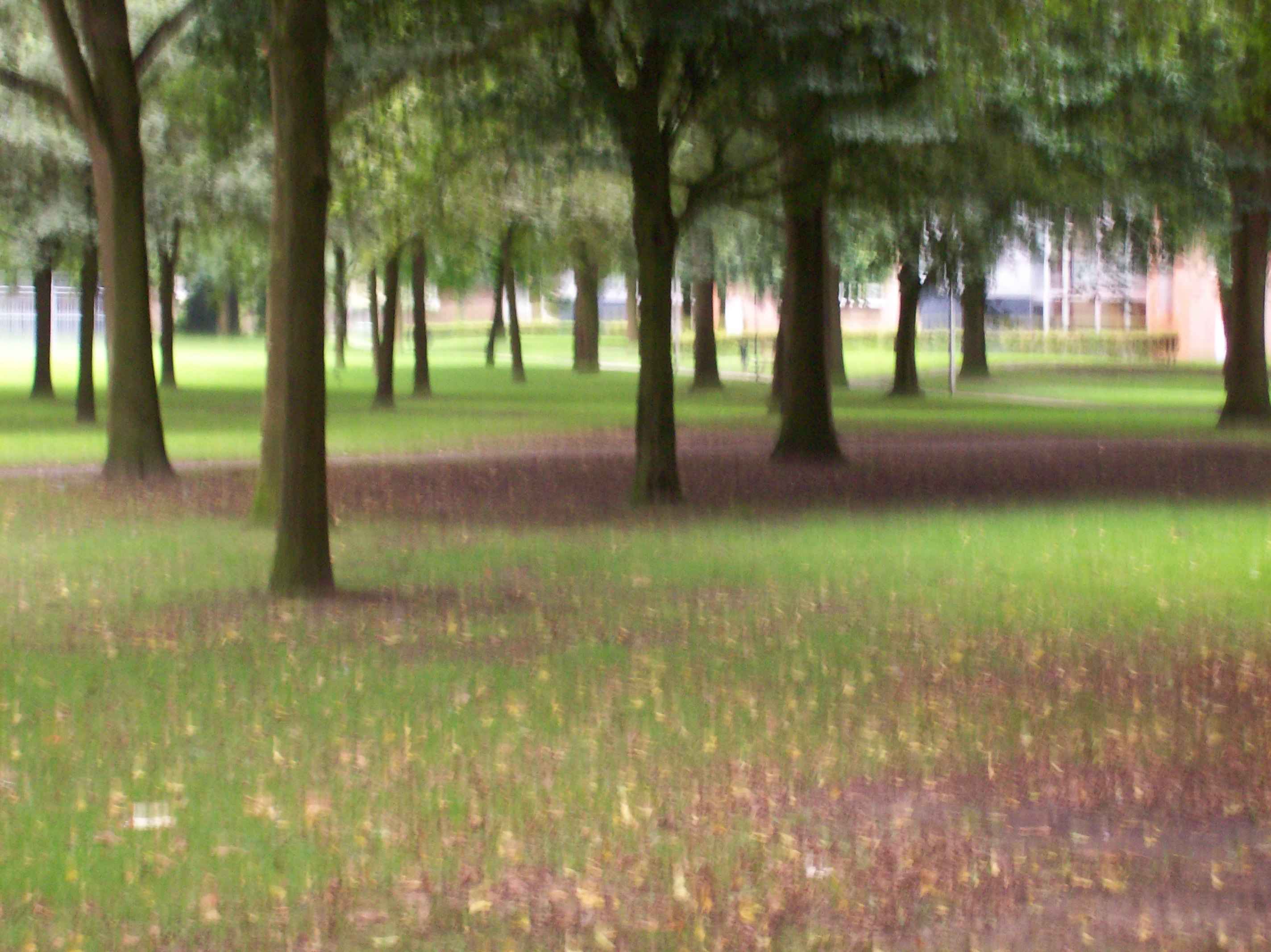Bert
 Little Bert with his whole family.
Little Bert with his whole family.
Bert as a schoolboy
Albert Postma, as was his full name, was the true Benjamin of
the family, as he was born on febrary 2nd 1922. This means he was 21
years younger than his oldest brother Jacob
and even differed 12 with
his youngest Joop.
The fact that his two oldest brothers Jacob and Hennie were sailing
makes the picture to the right very special. It is made on the only
occasion all the kids Postma were at home at the same time. This did
not last more than half a day.
Though maybe not
planned(familyplanning was
not very common in these days :-)), I believe he was still welcome in
the afterwar years, where economically things where going better as
before.
He was a bright kid, kind of wild and restless. In 1933 he
moved with his parents to the house de Kolhoop,
right next to the hotel
now run by his brother Jacob and his wife. After primary school he went
to the same secondary school his brother Joop went to in Ter Apel, the
H.B.S.
Here, he had a hard time. As his oldest brother Jacob clearly
sympathised with national-socialist idea's, and schoolmates of course
knew this, they took it out on him.
Kids can be hard for each other.
Finally, he couldn't or wouldn't bear it anymore, and he
left school. Under the influence of his older
brother, he signed up for the Waffen SS.
If he might have thougt this would be easier, he was quickly cured from
this idea. The discipline, the training and the mentality were very
hard. So hard, he ran off once, back to Emmen, because he could take it
anymore. Alas, his own mother sent him back to the barracks. As we
know now, back to hell on earth later on.
 On
this
picture to the left you can see Bert home on leave.
On
this
picture to the left you can see Bert home on leave.
From left to right: Joop, Jacob(in the uniform of the NSB, the
dutch
national-socialist movement), mother Janna,
Bert in his uniform, Frouwkje
and father Sjouke.
The
signs on his uniform indicate, that at this time he had the
rank of SS Sturmmann, which is about that of a corporal.
This picture was taken the 20th of march 1943. Sadly, Sjouke deceased
just a few weeks later, on the fourth of may 1943. Sjouke looks sad to
me on the picture, and he most likely
is,
as he did not approve of the political pro-german choices some of his
sons made.
Looking at Bert all I can think is: "You look so self-confident and
thought you were so right, and history has proven you so terribly,
horribly wrong."
Bert went to fight at the Eastern Front with the Waffen-SS brigade
"Wiking", in Russia and the Ukraine. Finding where he was or what he
exactly did was an impossible task for me. I know for sure, that
overthere nobody stayed innocent. To the best of my knowledge
"Wiking" did not participate actively at the Holocaust e.g. as guards
in concentration camps, but terrorised and murdered the local
population in the East just as well. He did active service for
about 2 years, got severely wounded and came out of the war
with a body full of grenade-splitters and a traumatised mind. Here's a
link about the
'Wiking'-brigade: SS Division
Wiking And one about Dutchmen
in the Waffen SS.
He never distanced himself from the Waffen SS and what it stood for,
and
kept in touch with other former 'comrades' throughout the rest of his
life.
After the Nazi's lost, he became a P.O.W. in Austria with the
Americans.
When he learned his mother was arrested back home, he fled from there
and
managed to get to Holland. He gave himself up to the Dutch autorities
and came in the same camp his mother was, the former
'Durchgangslager'(=transitconcentrationcamp) Westerbork, now used
by the Dutch for collaborators an war-criminals. Practical people, the
Dutch. Used the former concentrationcamp now for their own purpose.
Mother was released quite soon with the help
of brother Hennie. Bert managed
to escape again from there, never to return to the Netherlands again
under the name Bert Postma. He crossed the border to Germany, a
dismembered land in shatters.
With the help of Mennonites
and his brother Joop(who also lived under an assumend identity for
several years) he came in possession of the identity of a poor devil
who died at the eastern front, fighting for a useless cause. This is
the name assumed throughout the rest of his life in Germany.
Posing as one of the millions "Heimatvertriebenen", "people driven away
from their home", one would translate this, he ended up in
refugeecamps. The
story of these people is a very sad one, as they were subjected
to what we in today's terms would call etnic cleansing, like in Bosnia.
As Germany, homeland of a dreadful
unprecedented regime, lost WW II, the map of Europe was redivided, and
in the East millions of etnic Germans were driven out of their homes
and the places they grew up. Again, grave unjustice, or in good
american english: "shit happens".
He stayed in a refugeecamps, where he tried to
pick up life and did so quite well. He
worked at a farm nearby, got a certificate of good conduct and met his
future wife in the refugeecamp. She again was a refugee,
already from
before
Hitler lost the war but divided the European cake with Stalin. She was
on the wrong piece of the cake, near Lvov(in Polish), Lviv(in
Ukrainian)
or Lemberg(in German). The three names of this town show what happened
with this part of the world within several centuries. It became Lvic,
so she and her whole German family wer kicked out.
They married, he again under his assumed name.. He worked in
transportation
business.
A few years after the war, their first son was born, Klaus. The name
was no coincidence.
Though he deeply disagreed with him in political views, he named him
with the German version of his own brother Klaas, who died as a hero in the
resistance against the nazi-occupators.
Bert did well in his job.
It brought them to move to several places in Germany.
Summer holidays were mostly spent in Ost-Friesland, which makes sense
if you consider that this part of Germany is the most similar to the
North of the Netherlands, in landscape as well as in mentality of the
people. On the way there, he usually met his sister Frouwkje and his mother Janna in Meppen, right across the Dutch
- German border, near to Emmen where these two lived.
 Here's
a picture of Bert with mother Janna.
It was taken somewhere near Meppen(D), close
tho the Dutch border.
Here's
a picture of Bert with mother Janna.
It was taken somewhere near Meppen(D), close
tho the Dutch border.
In fact he went to Holland several times, but never
to Emmen, as he could be easily reckognised there by people who knew
him from before.
I heard some - unconfirmed - rumours that his presence in Holland was
not always unnoticed by - lower rank - authorities. But as he was a
'small fish', no action was taken to arrest him. It had no priority.
The crimes he might or might not commited as member of the Waffen
SS, had taken place outside their jurisdiction. Mind you, the Cold War
was going
on and the whole Sowjetunion was a complete 'no go area' for westerners.
What Bert told his children:
All of his family from Prussia was
killed during war, but as a child he also had lived in
Holland for a long time(Which wasn't a lie....).
So these two women, Janna and Frouwkje, were of a befriended
family from Holland. Being
kids, they of course bought the story(what else?), and called them
tante Frouwkje(=aunt Frouwkje) and kleine Oma(=little grandma) anyhow.
Without knowing this was in fact for real.
That was all they knew throughout their childhood, and also as young
adults.
Bert did all his best to be a loving father and husband.
He 'forgot' his former identity. Of course
his wife knew, but she loved him. His parents-in-law knew, probably.
Former comrades from the Wiking-brigade
visited him, of course they knew.
But for the rest of the world, he was a Mennonite boy born in in
East-Prussia.
In 1982, Bert already was on early pension, fate struck: His oldest son
Klaus, seemingly in very good health, died very suddenly. He had a weak
spot in his vains, he carried with him without knowing, an aneurysma.
The vain breaks open and you bleed to death inside.
That night, Bert broke. Crying he told his remaining son
the truth about his real identity. But even then, he was very brief
about it.
The young man
passed away, never knowing that, in fact, he was named after a
brother of
his father, Klaas Postma. Nor did he
learn about his dad's true identity
Bert did not grow old. Two years after his son died, he passed
away, in hospital. Official age:
61 years. True age: 62.
Cause of death: cancer, gone to his brain later on.
He had an outgoing personality, who liked the company of other persons,
liked attention. He was dominant and a strict father. But as his one
living son stressed, he hardly ever raised his hand to them when they
were boys. He never in his
heart dismissed the ideology he was taught in his youth. He stated
that then everything they had fought for would have been for nothing.
This implies of course his elder brother would have died for the wrong
course.
Yet, he named his oldest son after him.... How this all fits, beats
me....
He drank and ate to much al his live. And thus became the typical fat
German, the cliche the Dutch sometimes joke about. And maybe
that's what he wanted, living the perfect cover.
His children had ideological discussions with him throughtout their
youth,
both disagreeing with him a 100%. Their mother kept the balance and
peace between
them.
Bert was buried. There was a grave with a tombstone, on which in fact
the only
genuine true
thing was his date of decease.
After 20 years, the standard term on this graveyard, it was removed.
Dust to dust.......

That was Bert, who made a dumb decision as a very young man, survived
the war, but dealt with the consequenses for the rest of his life.
Back to the hotel
To the Famliyportrait

 Little Bert with his whole family.
Little Bert with his whole family.
 On
this
picture to the left you can see Bert home on leave.
On
this
picture to the left you can see Bert home on leave. Here's
a picture of Bert with mother Janna.
It was taken somewhere near Meppen(D), close
tho the Dutch border.
Here's
a picture of Bert with mother Janna.
It was taken somewhere near Meppen(D), close
tho the Dutch border.
